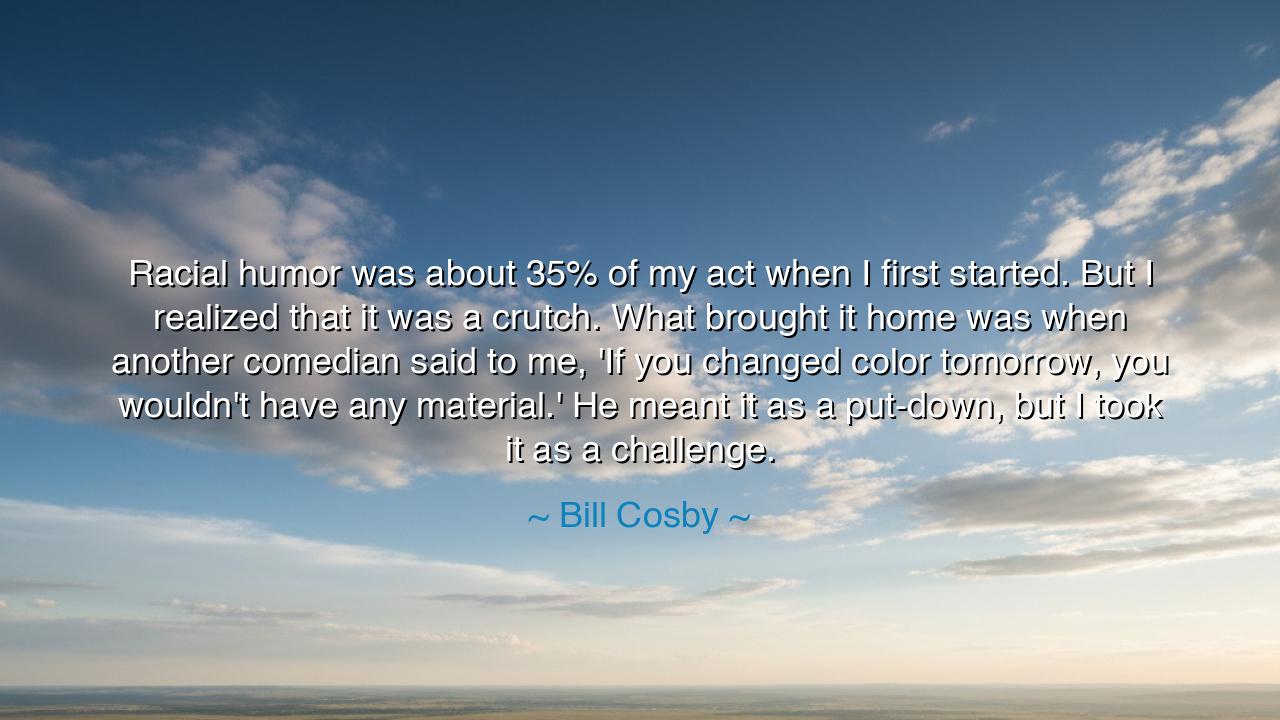
Racial humor was about 35% of my act when I first started. But I
Racial humor was about 35% of my act when I first started. But I realized that it was a crutch. What brought it home was when another comedian said to me, 'If you changed color tomorrow, you wouldn't have any material.' He meant it as a put-down, but I took it as a challenge.






In the words of Bill Cosby, spoken from the forge of experience, lies a lesson carved deep in the heart of every creator and seeker of mastery: “Racial humor was about 35% of my act when I first started. But I realized that it was a crutch. What brought it home was when another comedian said to me, ‘If you changed color tomorrow, you wouldn’t have any material.’ He meant it as a put-down, but I took it as a challenge.” These words, simple yet weighty, reveal the moment when an artist awakens—not to the laughter of others, but to the truth within himself. It is the moment a man looks at what he depends upon, and asks whether it gives him power, or merely chains him in comfort.
In his youth, Cosby stood among the laughter and applause of crowds who found amusement in the mirror of race. It was a time when the world’s wounds were still open, when laughter could be both weapon and shield. To use racial humor was to wield a blade sharpened by shared pain—it worked easily, it connected instantly. Yet even as it succeeded, it limited. The artist who relies on the obvious, on the surface, on the accident of birth, becomes a prisoner of what he knows too well. To discover this is to feel both humility and liberation. For the wise soon learn that what pleases others is not always what strengthens the soul.
The blow came not from fate, but from the lips of another: a rival’s taunt, a put-down meant to wound. “If you changed color tomorrow,” said the man, “you wouldn’t have any material.” Such words could have broken a lesser spirit. But Cosby, rather than taking offense, found revelation in insult. The jibe became a mirror, showing him that he had built his stage upon the shifting sands of identity rather than the stone of universality. The insult that was meant to shame him became his challenge, his turning point—the spark that burned away dependence and revealed the path to mastery.
In every age, there are moments when the great are shaped by scorn. Michelangelo, when criticized for painting too vividly the agony of the soul upon the ceiling of the Sistine Chapel, did not bow to the whispers of disapproval. Instead, he labored until paint became prayer. Beethoven, when told that his deafness had ended his genius, answered not with complaint but with the creation of his Ninth Symphony—music that heard eternity even in silence. So too did Cosby, when faced with mockery, turn inward and decide that he would no longer lean upon what the world expected of him. He would speak to what was universal, what was human, what could make anyone laugh—not because of who they were, but because of what they felt.
This moment, my friends, is not just for the comedian—it belongs to all who strive to rise. Every man and woman carries a crutch—something they use not to advance, but to avoid falling. It may be comfort, talent, reputation, or circumstance. These things are not evil, but they are chains disguised as gifts. The path to mastery demands that one let go of these supports and learn to stand upon truth alone. The day you cast aside your crutch is the day you begin to grow.
The wisdom of Cosby’s transformation lies in his courage to redefine himself. He could have continued down the easy road—pleasing crowds, feeding laughter built upon familiarity—but he chose the harder way. He sought to speak beyond race, beyond division, to the shared heart of humanity. And in doing so, he became a bridge. His humor ceased to be a mirror of one group’s experience and became a reflection of all human life—our joys, our follies, our tender absurdities. That is the mark of a true artist: one who does not merely echo the times, but transcends them.
So, what lesson can we take from this? It is this: Do not fear criticism—let it refine you. Do not cling to what makes you comfortable—let it challenge you. When the world mocks you, listen not for pain, but for truth hidden beneath the sting. If your identity, your work, your worth depend on one narrow pillar, know that you are not yet free. Build your craft on what no change of circumstance can take away—on your insight, your integrity, your spirit.
For in the end, the greatest victory is not to silence your critics, but to prove them unnecessary. As Bill Cosby did, take every insult as invitation, every doubt as discipline, and every weakness as the seed of strength. And when the day comes that your art, your life, or your laughter stand on their own, you will know the truth of his wisdom: that the soul does not grow by what it leans on—but by what it learns to live without.






AAdministratorAdministrator
Welcome, honored guests. Please leave a comment, we will respond soon